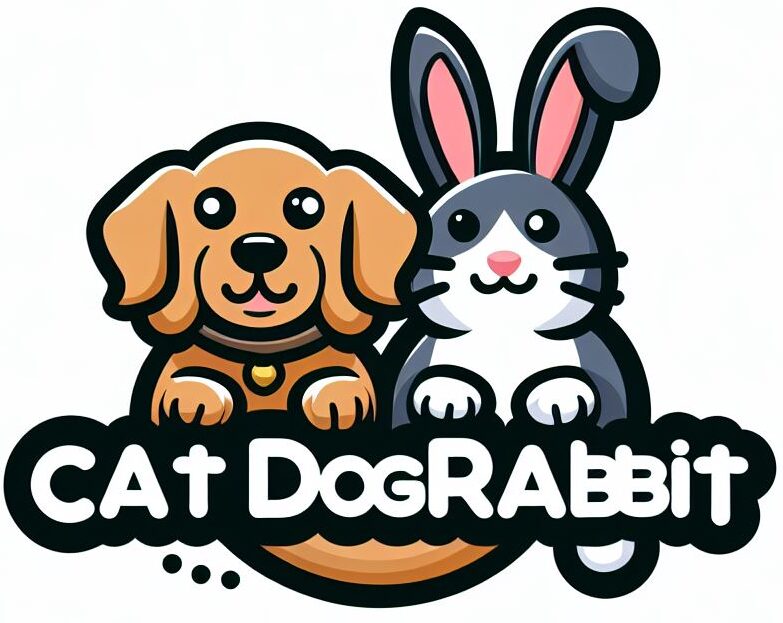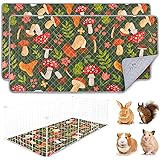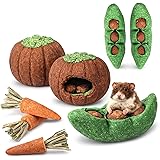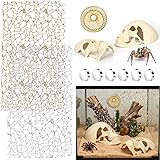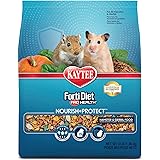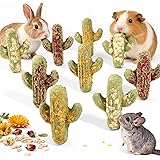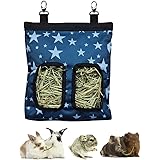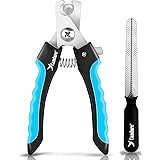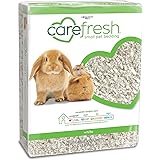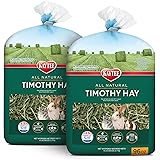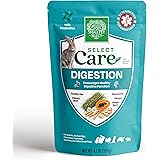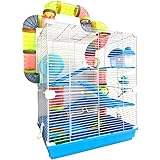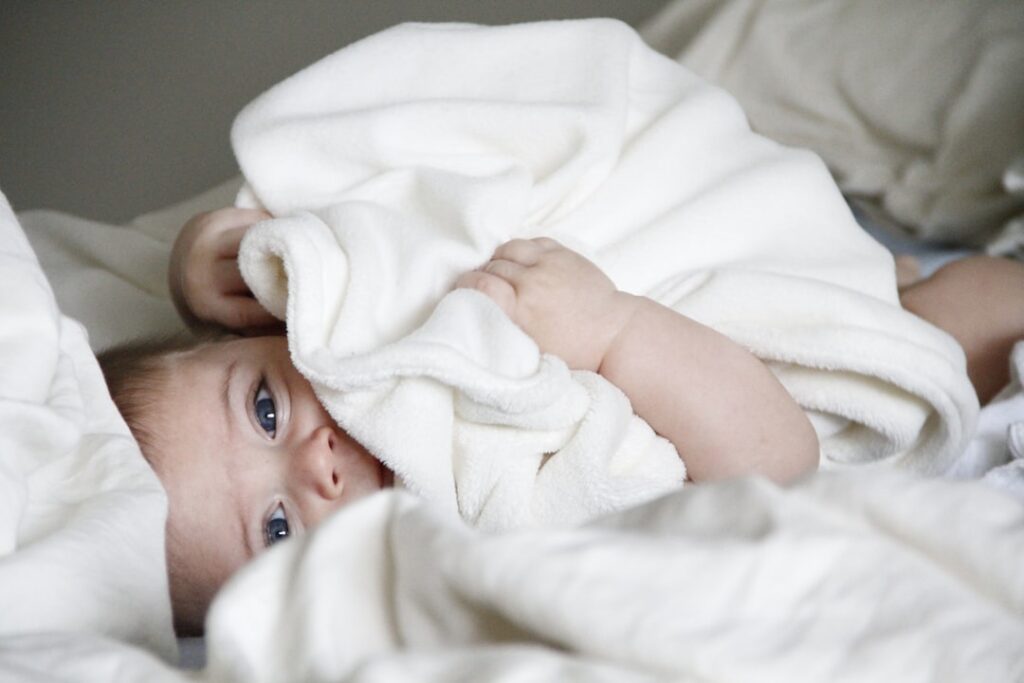
Oxbow Pure Comfort Bedding, Rabbit, Hamster, & Guinea Pig Bedding, Bunny Supplies for Litter Box, Pet Safe, Low Dust, White Paper, 72 Liter Bag
$17.99 (as of 02/08/2026 14:07 GMT +00:00 - More infoProduct prices and availability are accurate as of the date/time indicated and are subject to change. Any price and availability information displayed on [relevant Amazon Site(s), as applicable] at the time of purchase will apply to the purchase of this product.)2 Pack Washable Guinea Pig Cage Liner, Reusable Guinea Pig Mat, Waterproof Super Absorbent Pee Pads for Small Animals
$22.79 (as of 02/08/2026 14:07 GMT +00:00 - More infoProduct prices and availability are accurate as of the date/time indicated and are subject to change. Any price and availability information displayed on [relevant Amazon Site(s), as applicable] at the time of purchase will apply to the purchase of this product.)HERCOCCI 8Pcs Guinea Pig Chew Toys, Rabbit Toys Prevent Excessive Teeth Growth Natural Vegetables Carrot and Timothy Grass for Guinea Pig Hamsters Chinchillas Gerbil
$8.99 (as of 02/08/2026 14:07 GMT +00:00 - More infoProduct prices and availability are accurate as of the date/time indicated and are subject to change. Any price and availability information displayed on [relevant Amazon Site(s), as applicable] at the time of purchase will apply to the purchase of this product.)11PCS Jumping Spider Accessories with Skull Hide & Décor | Jumping Spider Enclosure Kit with Golden Cave Platforms, Net Jumping Spider Climbing Toy with Skulls, Small Reptile Enclosure Decorations
$4.99 (as of 02/08/2026 14:07 GMT +00:00 - More infoProduct prices and availability are accurate as of the date/time indicated and are subject to change. Any price and availability information displayed on [relevant Amazon Site(s), as applicable] at the time of purchase will apply to the purchase of this product.)Kaytee Forti-Diet Pro Health Nourish+Protect Hamster and Gerbil Food, Comprehensive Nutrition Backed by Science, Digestive Health, Immune Support, 3 Pounds
$5.99 (as of 02/08/2026 14:07 GMT +00:00 - More infoProduct prices and availability are accurate as of the date/time indicated and are subject to change. Any price and availability information displayed on [relevant Amazon Site(s), as applicable] at the time of purchase will apply to the purchase of this product.)Abizoo Rabbit Chew Toys Natural Timothy Hay Oat Bunny Treats Snack Bunny Chew Sticks 9 Pcs Compressed Cactus Bunnies Enrichment Toys for Rabbit Guinea Pig Hamster Chinchilla Gerbil Dental Care
$13.99 (as of 02/08/2026 14:07 GMT +00:00 - More infoProduct prices and availability are accurate as of the date/time indicated and are subject to change. Any price and availability information displayed on [relevant Amazon Site(s), as applicable] at the time of purchase will apply to the purchase of this product.)Hanging Hay Feeder Bag for Guinea Pigs, Bunnies, Chinchillas. Stars
$9.99 (as of 02/08/2026 14:07 GMT +00:00 - More infoProduct prices and availability are accurate as of the date/time indicated and are subject to change. Any price and availability information displayed on [relevant Amazon Site(s), as applicable] at the time of purchase will apply to the purchase of this product.)Candure Dog Nail Clippers and Trimmer with Safety Guard to Avoid Over-Cutting Toe Nails Professional Grooming Pet Nail Clipper with Nail File for Small Medium-Large Breeds
$5.36 (as of 02/08/2026 14:07 GMT +00:00 - More infoProduct prices and availability are accurate as of the date/time indicated and are subject to change. Any price and availability information displayed on [relevant Amazon Site(s), as applicable] at the time of purchase will apply to the purchase of this product.)VOLUAS Automatic Cat Feeders - Timed Pet Feeder for Cats and Dogs with Dry Food Dispenser, Desiccant Bag, Programmable Portion Control, 4 Daily Meals, 10s Voice Recorder
$35.00 (as of 02/08/2026 14:07 GMT +00:00 - More infoProduct prices and availability are accurate as of the date/time indicated and are subject to change. Any price and availability information displayed on [relevant Amazon Site(s), as applicable] at the time of purchase will apply to the purchase of this product.)Owning a bunny can be a truly rewarding experience. These adorable creatures bring joy and companionship to our lives, and their playful nature can brighten even the gloomiest of days. However, along with the joys of bunny parenthood come great responsibilities. It is important to understand the basics of bunny care in order to provide a happy and healthy life for your furry friend.
Key Takeaways
- Bunny parenthood comes with both joys and responsibilities.
- Bunny-proofing your home is important to ensure your bunny’s safety.
- Newborn bunnies should be fed a diet of hay, fresh vegetables, and a small amount of pellets.
- Common health issues in bunnies include dental problems and gastrointestinal issues, which can be prevented through proper diet and regular check-ups.
- Regular grooming, including brushing and nail trimming, is important for your bunny’s health and happiness.
Preparing Your Home for a Newborn Bunny: Bunny-Proofing Tips
Bunnies are curious creatures by nature, and they love to explore their surroundings. Unfortunately, this often involves chewing on things that they shouldn’t. Before bringing your newborn bunny home, it is crucial to bunny-proof your living space to ensure their safety.
Start by removing any toxic plants or household items that could harm your bunny if ingested. Bunnies have a tendency to chew on electrical cords, so make sure to cover them or keep them out of reach. Additionally, secure any loose wires or cables that could pose a strangulation risk.
It is also important to protect your furniture and belongings from bunny teeth. Provide plenty of safe chew toys for your bunny to satisfy their natural chewing instincts. You can also use bitter apple spray on furniture legs or other items that you want to discourage your bunny from chewing on.
Feeding Your Newborn Bunny: What to Feed and How Often
Proper nutrition is essential for the health and well-being of your newborn bunny. Bunnies have specific dietary needs that must be met in order to prevent health issues such as dental problems and gastrointestinal stasis.
The majority of a bunny’s diet should consist of hay, which provides essential fiber for their digestive system. Fresh vegetables should also be included in their diet, with a focus on leafy greens such as kale, spinach, and romaine lettuce. It is important to introduce new foods gradually to avoid digestive upset.
In addition to hay and vegetables, bunnies also require a small amount of pellets to ensure they receive all the necessary nutrients. However, it is important not to overfeed pellets, as this can lead to obesity and other health issues. Consult with your veterinarian to determine the appropriate amount of pellets for your bunny’s age and size.
Bunny Health 101: Common Health Issues and How to Prevent Them
| Common Health Issues | Prevention Tips |
|---|---|
| Gastrointestinal Stasis | Provide plenty of hay and water, feed a balanced diet, and encourage exercise |
| Dental Problems | Offer hay and chew toys to promote dental wear, avoid sugary treats, and schedule regular dental check-ups |
| Respiratory Infections | Keep the living area clean and well-ventilated, avoid exposure to cigarette smoke and other irritants, and seek veterinary care at the first sign of illness |
| Parasites | Practice good hygiene, keep living areas clean, and use flea and tick preventatives as recommended by a veterinarian |
| Heat Stroke | Provide shade and plenty of water, avoid exercising during the hottest parts of the day, and never leave a bunny in a hot car |
Bunnies, like any other pet, can be prone to certain health issues. It is important to be aware of these common problems and take steps to prevent them.
One common health issue in bunnies is dental problems. Bunnies’ teeth grow continuously throughout their lives, and if they do not have proper chewing outlets, their teeth can become overgrown and cause pain and difficulty eating. Providing plenty of hay and safe chew toys can help prevent dental issues.
Another common health issue in bunnies is gastrointestinal stasis, which is a slowdown or stoppage of the digestive system. This can be caused by a variety of factors, including a lack of fiber in the diet or stress. To prevent gastrointestinal stasis, make sure your bunny has access to plenty of fresh hay and a balanced diet.
It is also important to keep an eye out for signs of illness in your bunny, such as changes in appetite, behavior, or bathroom habits. If you notice any concerning symptoms, it is important to consult with a veterinarian who specializes in exotic pets.
Bunny Grooming: How to Keep Your Bunny Clean and Healthy
Bunnies require regular grooming to keep their fur clean and healthy. While they are generally clean animals that groom themselves, they may need some assistance from their human caregivers.
One important aspect of bunny grooming is brushing their fur. This helps remove loose hair and prevents matting. Use a soft brush or comb specifically designed for bunnies, and be gentle to avoid causing any discomfort.
Bunnies also need regular nail trims to prevent their nails from becoming overgrown and causing pain or injury. You can use a pair of small animal nail clippers or take your bunny to a veterinarian or groomer who is experienced in bunny care.
Additionally, it is important to keep your bunny’s living space clean. Regularly clean their litter box and provide fresh bedding to prevent odors and maintain a healthy environment.
Bunny Behavior: Understanding Your Bunny’s Body Language and Behaviors

Bunnies have their own unique body language and behaviors that can tell us a lot about how they are feeling. Understanding these cues is essential for effective communication and building a strong bond with your bunny.
For example, a bunny that is relaxed and content will have their ears in a neutral position, with their body relaxed and their tail resting comfortably. On the other hand, a bunny that is scared or anxious may have their ears flattened against their back, their body tense, and their tail tucked tightly.
Bunnies also communicate through various behaviors, such as thumping their hind legs to signal danger or digging to create a comfortable resting spot. By observing and understanding these behaviors, you can better meet your bunny’s needs and provide them with a safe and comfortable environment.
Bunny Playtime: Fun Activities to Keep Your Bunny Active and Happy
Bunnies are active animals that require plenty of exercise and mental stimulation to stay happy and healthy. Providing them with opportunities for playtime is essential for their well-being.
One fun activity for bunnies is providing them with tunnels or mazes to explore. Bunnies love to run through tunnels and hide in cozy spaces, so providing them with these opportunities can keep them entertained for hours.
You can also provide your bunny with puzzle toys or treat-dispensing toys to keep them mentally stimulated. These toys require your bunny to work for their treats, which can help prevent boredom and encourage natural behaviors.
Additionally, spending time interacting with your bunny is important for their socialization and mental well-being. Take the time to play with your bunny, provide them with toys to toss and chew on, and engage in gentle petting and grooming sessions.
Bunny Training: How to Litter Train and Teach Basic Commands
Contrary to popular belief, bunnies can be trained just like any other pet. Litter training is an important aspect of bunny training, as it helps keep their living space clean and prevents accidents.
To litter train your bunny, start by placing a litter box in a corner of their enclosure or designated play area. Bunnies naturally prefer to use one spot for their bathroom needs, so they will likely gravitate towards the litter box. When you see your bunny using the litter box, reward them with praise or a small treat.
Consistency is key when it comes to litter training. Make sure to clean the litter box regularly and provide fresh bedding to encourage your bunny to continue using it. If accidents occur outside of the litter box, clean up the mess thoroughly and place some of the soiled bedding in the litter box to help your bunny associate that spot with their bathroom needs.
In addition to litter training, you can also teach your bunny basic commands such as “come” or “up.” Use positive reinforcement techniques such as treats or praise to reward your bunny for following commands. Keep training sessions short and fun, and always end on a positive note.
Bunny Bonding: How to Build a Strong Relationship with Your Bunny
Building a strong bond with your bunny is important for their overall well-being. Bunnies are social animals that thrive on companionship and interaction with their human caregivers.
One way to build a strong bond with your bunny is through gentle handling and petting. Spend time each day sitting with your bunny, offering gentle strokes and scratches. This helps your bunny associate you with positive experiences and builds trust.
You can also bond with your bunny through playtime and interactive activities. Engage in games such as hide-and-seek or provide your bunny with toys to toss and chase. This not only provides mental stimulation for your bunny but also strengthens the bond between you.
It is important to remember that each bunny is unique and may have different preferences when it comes to bonding. Pay attention to your bunny’s body language and cues, and adjust your interactions accordingly. Building a strong bond takes time and patience, but the rewards are well worth the effort.
Tips for a Hoppy Life with Your Newborn Bunny
Owning a bunny can be a wonderful experience filled with joy, love, and companionship. By understanding the basics of bunny care, you can provide a happy and healthy life for your furry friend.
Remember to bunny-proof your home to keep your bunny safe, provide a balanced diet and regular grooming to keep them healthy, and take the time to understand their unique behaviors and needs. By bonding with your bunny through playtime and training, you can build a strong relationship that will bring you both years of happiness.
With proper care and attention, you can ensure a hoppy life for your newborn bunny. So go ahead, embrace the joys and responsibilities of bunny parenthood, and enjoy the love and companionship that these adorable creatures bring into our lives.
FAQs
What is a newborn bunny?
A newborn bunny is a baby rabbit that has just been born.
How big is a newborn bunny?
A newborn bunny is very small, usually about the size of a golf ball.
What do newborn bunnies eat?
Newborn bunnies drink their mother’s milk for the first few weeks of their life.
How long do newborn bunnies stay with their mother?
Newborn bunnies stay with their mother for about 4-6 weeks before they are weaned and able to eat solid food.
How do you take care of a newborn bunny?
If you find a newborn bunny, it is best to leave it alone and let its mother take care of it. If you are raising a newborn bunny, you should consult with a veterinarian or experienced rabbit breeder for proper care instructions.
What are some common health issues for newborn bunnies?
Newborn bunnies are susceptible to hypothermia, dehydration, and infections. It is important to keep them warm, hydrated, and in a clean environment to prevent these issues.
